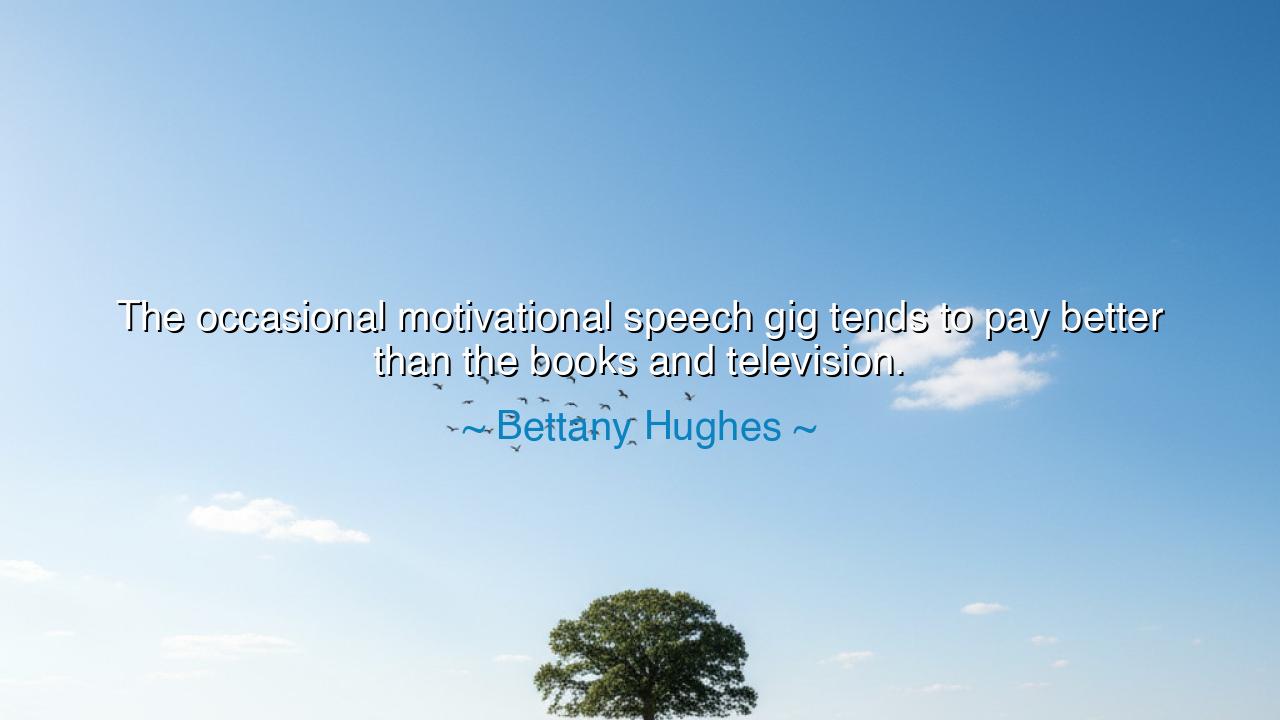
The occasional motivational speech gig tends to pay better than
The occasional motivational speech gig tends to pay better than the books and television.






Hear the words of Bettany Hughes, historian and storyteller, who observed with both humor and truth: “The occasional motivational speech gig tends to pay better than the books and television.” At first glance, this seems but a jest about the economics of modern life. Yet within it lies a deeper wisdom about the power of the spoken word, the hunger of humanity for living voices, and the value society places upon immediate inspiration compared to the slower rewards of scholarship and art.
At the heart of her statement is the recognition that speech has always carried a unique force. From the orators of Athens to the preachers of revival, from the generals addressing their armies to the leaders rallying nations, the live spoken word has stirred souls and reshaped destinies. Books may endure for centuries, and television may entertain millions, but a single voice speaking directly to an audience can strike like a thunderbolt, awakening hearts and kindling spirits. Hughes wryly points out that society is willing to pay dearly for this fire in the moment, even if it undervalues the slow labor of writing or producing knowledge.
History abounds with examples of this truth. Consider Demosthenes, who trained his broken voice into a weapon that could move the Athenian people to action. Or recall Winston Churchill, whose wartime speeches inspired a beleaguered island to stand unbroken against tyranny. Neither man was paid in coin for those words, but their nations were enriched beyond measure. Even today, the tradition continues: leaders, athletes, and thinkers command great reward for motivational speeches, for their words strike at the heart of human need—the need for courage, for hope, for meaning.
Hughes, who has dedicated her life to books and television, understands the irony. The written word demands years of toil, research, and revision. Television requires coordination, planning, and often compromise. Yet a single evening at a podium, speaking from one’s heart, may yield more tangible reward than months of scholarly labor. This is not to devalue the written word, but to remind us that society often hungers more for immediate inspiration than for slow, enduring wisdom.
Yet there is another lesson here: that true value lies not in money but in impact. The book may reach a single searching reader centuries after the author has died. The television program may be replayed long after the presenter has faded from memory. And the speech, though fleeting, may plant a seed that grows in a listener’s soul, shaping a lifetime. Hughes’s words reveal the strange balance between fleeting and lasting, between inspiration in the moment and knowledge that endures.
The deeper meaning of her observation, then, is that we must not measure worth only by reward. Motivational speeches may pay well, but the silent labor of scholarship and storytelling feeds civilization in ways money cannot measure. Both are needed: the quick spark of inspiration, and the enduring light of wisdom. A society that honors both will flourish, for it will be stirred to action by speech and guided to reflection by books.
What lesson, then, must we take? It is this: let us honor not only those whose words inspire us in the moment, but also those whose patient labor gives us lasting truths. Seek both kinds of wisdom—the fire that comes from a voice in the present, and the steady flame that glows from the written page. And in your own life, do not hesitate to speak when the moment calls, for a single word of encouragement may change a life. But also do not neglect the quieter work, whose fruits may nourish generations unseen.
Thus let Bettany Hughes’s words be remembered not only as a witty truth about reward, but as a reflection of the eternal power of human expression: the voice that inspires, the book that endures, and the wisdom that uplifts both. May we seek to live in such a way that our words, whether spoken or written, become treasures to those who hear them.






AAdministratorAdministrator
Welcome, honored guests. Please leave a comment, we will respond soon